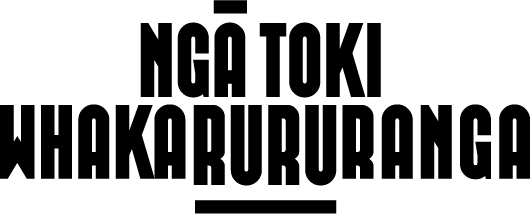Creatives
Māori art, reo and culture has become a way for companies with no connection to Māori to brand their products and make profits using our taonga. The rules around free trade agreements have never been about protecting mātauranga Māori or reinforcing our role as kaitiaki over our land and taonga.
Whakapapa, mātauranga Māori, a mātou kōrero (our stories), te reo, tā moko, waiata, haka, whakairo, raranga, taonga pūoro, toi o naianei (contemporary art), ngā rawa hoahoa (design assets), whaikōrero and more are the essence of being Māori. Te Tiriti o Waitangi affirms our ongoing rangatiratanga over those taonga and our collective intergenerational duty as kaitiaki.
But some of the world’s most powerful transnational corporations with no connection to Māori have been helping themselves to our tāonga for decades. Netflix, Facebook and Spotify are so big they ignore, or sometimes co-opt, Indigenous voices, while they profit from theft of our imagery, stories and ideas.
“Free trade” agreements allow mega-corporations in the culture, entertainment, digital and media sectors to restrict government policy and regulations that get in their way. For example, free trade agreements (FTAs) require states around the world, including Aotearoa, to have intellectual property laws that allow corporations to claim exclusive private property rights over taonga Māori, and, what’s more, to protect those intellectual property rights if they are breached.
For example, in 2002, singer Moana Maniapoto was told she couldn’t perform under her own name in Germany because someone trade-marked the word “Moana” for almost everything, even toilet paper. Moana’s documentary Guarding the Family Silver shows many more examples from Lego, Ford Motor Company and others. Despite this example, the newly signed FTA with the European Union provides the same guarantees for corporations and no protections for Māori.
These “trade” rules aren’t limited to intellectual property. They also cover “services” like broadcasting, publishing, visual media and entertainment. In the 1990s we were told the government had signed away the power to require local content quotas for broadcasting that would have ensured more “New Zealand” – including Māori music and te reo Māori – content was delivered on air. The Crown revisited this in later agreements, but it hasn’t revised the original bad agreement that still applies on a global scale.
Corporate rights also protect the likes of Amazon who supply digitalised services from offshore, making it almost impossible to take action against abuses like the sale of shower curtains decorated with images with mokomokai or websites hosting videos that denigrate the haka Ka Mate.
There are no equivalent protections against the abuse and defiling of taonga, no rights for Māori to control their use and no requirement for corporations to seek free, prior and informed consent. For example, the recent UK FTA could have provided some real protections for the haka Ka Mate. Instead, the unenforceable Maori Trade and Economic Cooperation chapter simply “recognises” the significance of the haka Ka Mate to Ngāti Toa, and says the UK and NZ will “jointly endeavour to identify appropriate means to advance its recognition and protection”. Doesn’t sound particularly solid or urgent.
Free trade agreements trump other international agreements that are designed to protect indigenous culture, such as the UNESCO Convention on Cultural Diversity and the UN Declaration on the Rights of Indigenous Peoples. The rules around free trade agreements have never provided effective protections for mātauranga Māori or Māori in our role as kaitiaki over our whenua and taonga. Nor are there any effective protections against exploitation. Effectively, what is at stake here is our inter-generational legacy as Māori and our mana motuhake (exclusive rights) over our unique cultural assets; the right of Māori to define the legacy for our generations to come.
The so-called Treaty of Waitangi Exception (which the Crown has included in FTAs since 2001) fails to ensure the Crown prioritises its Tiriti obligations over trade agreement’s rules. It fails to guarantee Māori the exercise of their rights to prevent the debasing of our taonga, or demand that the Crown affords us the powers us to do so.
Yes, Māori creatives want to take our stories to the world. But it needs to be on our terms and in ways that we control. We want our music to be heard, our performers to be valued, our images to be seen, our writing to be read, our art and whakairo to be treasured. We want to exhibit in places where people can share in our taonga, sell our books in major bookstores and online. We want to take advantage of the digital spaces, create our apps, our games, our tiktoks.
But to do this we need trade rules that create and support these opportunities, remove the ability for powerful corporations to usurp that power, and remove the barriers that existing trade agreements put in our way.

